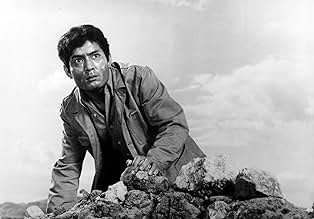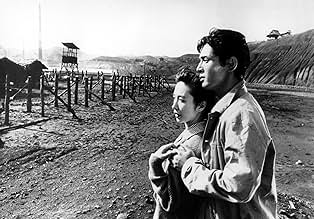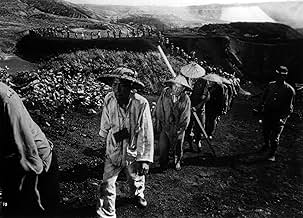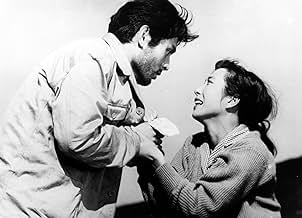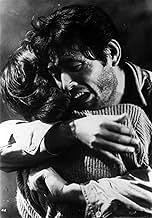AVALIAÇÃO DA IMDb
8,5/10
10 mil
SUA AVALIAÇÃO
Adicionar um enredo no seu idiomaA Japanese pacifist, unable to face the dire consequences of conscientious objection, is transformed by his attempts to compromise with the demands of war-time Japan.A Japanese pacifist, unable to face the dire consequences of conscientious objection, is transformed by his attempts to compromise with the demands of war-time Japan.A Japanese pacifist, unable to face the dire consequences of conscientious objection, is transformed by his attempts to compromise with the demands of war-time Japan.
- Direção
- Roteiristas
- Artistas
- Prêmios
- 5 vitórias e 1 indicação no total
Kôji Nanbara
- Kô
- (as Shinji Nanbara)
- Direção
- Roteiristas
- Elenco e equipe completos
- Produção, bilheteria e muito mais no IMDbPro
Avaliação em destaque
An interesting film that portrays the struggles of an idealistic young Japanese man who is challenged to employ his idealism in the service of the Japanese war effort in WW II. A key aspect of this struggle is the protagonist's struggle within himself. Kaji, the young man, seeks to humanize the brutal conditions at a mining operation in Manchuria. Further complicating matters is the profound sense of national prejudice that shapes the relationships between the various characters. To the workers & Chinese prisoners, regardless of his professed ideals, Kaji is Japanese and therefore an oppressor. Although Kaji tries to win their trust, his own frustration enables him to strike a young Chinese helper, reinforcing the image of the brutal Japanese. This weakness is a key underlying theme. Even late in the film, when he takes a very brave stand against some executions, his effort is a bit late and his stand is successful only when the Chinese prisoners take up the protest. He struggles because her fears he cannot live up to the ideals he expresses.
Kaji is also confronted with the another irony. Although he opposes the war, he has chosen a route of avoidance rather than resistance. This is emphasized early in the film during an evening with a friend who is about to be inducted. His friend comments that, although they opposed the war, neither of them was brave enough to face the penalty for resistance of life imprisonment. Shortly thereafter, he takes the mine job to get a military exemption. Yet, if he is successful, the production improvements in the mine only fuel the Japanese war machine.
A valuable film because it explores areas of the pacific war that are not well know in the west. Also an interesting observation in the danger of half-measures when taking a moral stance. Kaji is ultimately confronted with the fact that you cannot avoid the war, only oppose it or aid it. I look forward to viewing the next film.
Kaji is also confronted with the another irony. Although he opposes the war, he has chosen a route of avoidance rather than resistance. This is emphasized early in the film during an evening with a friend who is about to be inducted. His friend comments that, although they opposed the war, neither of them was brave enough to face the penalty for resistance of life imprisonment. Shortly thereafter, he takes the mine job to get a military exemption. Yet, if he is successful, the production improvements in the mine only fuel the Japanese war machine.
A valuable film because it explores areas of the pacific war that are not well know in the west. Also an interesting observation in the danger of half-measures when taking a moral stance. Kaji is ultimately confronted with the fact that you cannot avoid the war, only oppose it or aid it. I look forward to viewing the next film.
- FADrury
- 13 de abr. de 2003
- Link permanente
Enredo
Você sabia?
- CuriosidadesAccording to Tatsuya Nakadai, a marathon screening of the entire nine-and-a-half-hour "Human Condition" trilogy is held once a year in Japan, and he has once or twice attended these screenings, which are always sold out.
- Erros de gravaçãoAt one point a Japanese guard begins to whip Kao, yet the motions he makes are just a flailing of his arms, visibly missing the actor. Kao retaliates by throwing a rock at the guard, but the rock never strikes the guard. However, the actor playing the guard overreacts as if he has been struck.
- Citações
Kuroki Shochô: You know, Kaji, theory may be correct and yet not always apply to reality.
Kaji: Then either the theory is wrong or it was incorrectly applied.
- ConexõesFollowed by Guerra e Humanidade: Estrada Para a Eternidade (1959)
Principais escolhas
Faça login para avaliar e ver a lista de recomendações personalizadas
- How long is The Human Condition I: No Greater Love?Fornecido pela Alexa
Detalhes
- Data de lançamento
- País de origem
- Idiomas
- Também conhecido como
- Guerra e Humanidade
- Locações de filme
- Hokkaido, Japão(Exterior scenes of the Manchurian mine)
- Empresas de produção
- Consulte mais créditos da empresa na IMDbPro
- Tempo de duração3 horas 28 minutos
- Cor
- Mixagem de som
- Proporção
- 2.35 : 1
Contribua para esta página
Sugerir uma alteração ou adicionar conteúdo ausente

Principal brecha
By what name was Guerra e Humanidade: Não há Amor Maior (1959) officially released in India in English?
Responda


















